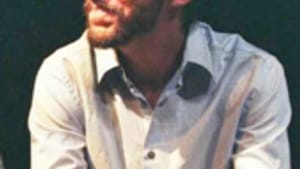Stay in the Loop
BSR publishes on a weekly schedule, with an email newsletter every Wednesday and Thursday morning. There’s no paywall, and subscribing is always free.
EgoPo's "Woyzeck'

Georg Buchner's forgotten (and disturbing) masterpiece
STEVE COHEN
When you experience the power and relevance of Woyzeck, it's surprising to note that it was written as far back as 1837 by Georg Büchner, who died that year at the age of 23. This drama is a forerunner of the Expressionist movement that stressed emotion above exposition, and this production goes far beyond a historical re-examination. It’s intensely sexual and violent.
The composer Alban Berg perceived how "modern" Woyzeck was in 1922 and wrote an operatic version, which was given its American premiere by Leopold Stokowski in Philadelphia. The opera is considered almost standard throughout the world but is rarely revived here, and the play has even fewer performances.
EgoPo's strongly-casted production has a ringmaster (Doug Greene) in top hat and black cape introduce the action. He personifies the manipulation that the title character suffers at the hands of society. Dan Hodge as Woyzeck disintegrates mentally and physically over the course of the 100-minute play, and he does so appealingly and believably. He has lucid moments alternating with hallucinations, and Brenna Geffers's direction makes the differences clear.
Woyzeck is abused by a variety of archetypal oppressors known simply as Drum Major, Doctor and Officer. Only Woyzeck and his lover Marie (portrayed sympathetically by Megan Hoke) appear as rounded human beings. Woyzeck is poor and unintelligent; he refers to himself as one of the common folk. Woyzeck and Marie have faith in God, yet their religiosity achieves them nothing.
You can easily read contemporary issues into Woyzeck’s story: economic inequality, abuses in the health care system, and reliance on religion and guns. I'm impressed with the ability of a 22 or 23-year-old to be so prescient while writing a dramatically effective play. Büchner also wrote Danton's Death, a tragedy about the French Revolution that’s sometimes revived.
Because Woyzeck was unfinished when Büchner died, it has been posthumously edited by a variety of authors. Most versions, including Berg's opera, end with Woyzeck stabbing Marie to death, then disposing of the knife in a pond and drowning, either intentionally or accidentally. This production has a different ending, more graphic and shocking than any other. As directed by Geffers, the ending is foreshadowed in earlier scenes and seems like a fitting conclusion.
Although it’s highly stylized, and although the characters seem to have little in common with their audience, this production connects with viewers and leaves a lasting, disturbing impression.
STEVE COHEN
When you experience the power and relevance of Woyzeck, it's surprising to note that it was written as far back as 1837 by Georg Büchner, who died that year at the age of 23. This drama is a forerunner of the Expressionist movement that stressed emotion above exposition, and this production goes far beyond a historical re-examination. It’s intensely sexual and violent.
The composer Alban Berg perceived how "modern" Woyzeck was in 1922 and wrote an operatic version, which was given its American premiere by Leopold Stokowski in Philadelphia. The opera is considered almost standard throughout the world but is rarely revived here, and the play has even fewer performances.
EgoPo's strongly-casted production has a ringmaster (Doug Greene) in top hat and black cape introduce the action. He personifies the manipulation that the title character suffers at the hands of society. Dan Hodge as Woyzeck disintegrates mentally and physically over the course of the 100-minute play, and he does so appealingly and believably. He has lucid moments alternating with hallucinations, and Brenna Geffers's direction makes the differences clear.
Woyzeck is abused by a variety of archetypal oppressors known simply as Drum Major, Doctor and Officer. Only Woyzeck and his lover Marie (portrayed sympathetically by Megan Hoke) appear as rounded human beings. Woyzeck is poor and unintelligent; he refers to himself as one of the common folk. Woyzeck and Marie have faith in God, yet their religiosity achieves them nothing.
You can easily read contemporary issues into Woyzeck’s story: economic inequality, abuses in the health care system, and reliance on religion and guns. I'm impressed with the ability of a 22 or 23-year-old to be so prescient while writing a dramatically effective play. Büchner also wrote Danton's Death, a tragedy about the French Revolution that’s sometimes revived.
Because Woyzeck was unfinished when Büchner died, it has been posthumously edited by a variety of authors. Most versions, including Berg's opera, end with Woyzeck stabbing Marie to death, then disposing of the knife in a pond and drowning, either intentionally or accidentally. This production has a different ending, more graphic and shocking than any other. As directed by Geffers, the ending is foreshadowed in earlier scenes and seems like a fitting conclusion.
Although it’s highly stylized, and although the characters seem to have little in common with their audience, this production connects with viewers and leaves a lasting, disturbing impression.
Sign up for our newsletter
All of the week's new articles, all in one place. Sign up for the free weekly BSR newsletters, and don't miss a conversation.
 Steve Cohen
Steve Cohen